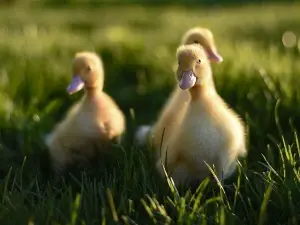
Ducklings are quite fragile, almost anything can injure the bird or make the bird sick. If there are any signs of your duckling being sick, like the duckling being wobbly, then you’d need to intervene.
This article looks into why your duckling may be wobbly
Table of Contents
Duckling wobbly:
Ducklings may be new to walking but this doesn’t mean that they’re bad at it. These birds have no problem walking almost immediately after hatching from their eggs.
However, if your duckling is struggling to walk properly then the bird likely has a niacin deficiency. This is what you need to know about it:
What is niacin?
Niacin is a nutrient that helps ducklings grow strong and healthy bones, the nutrient is also known as vitamin B3. Niacin is not only needed by ducklings to grow healthy bones but by other animals like chickens, other waterfowl as well as humans
This nutrient is water soluble, if the duck has too much of it in its body over a short period of time then the bird’s body will remove the excess in the bird’s waste. The bird’s body doesn’t keep this vitamin in its body long-term.
However, after being removed from the bird via the waste niacin will need to be consumed again by the ducking to be used by the body again
How does it benefit ducklings?
Niacin benefits ducklings in that it enables the bird’s bones to develop correctly.
This nutrient is also helpful as it helps the bird’s body convert nutrients like carbohydrates, proteins, and fats into energy that the bird can use.
What happens if ducklings lack niacin?
Ducklings need large amounts of niacin in their bodies in order to grow well. These birds need more niacin than chicks making this a very essential nutrient for the birds
If your duckling lacks niacin then the bird can develop issues with its leg like being wobbly. The bird may also be bow-legged and its hock joints will also be enlarged.
All of this will eventually cause the bird to not be able to walk.
How to treat your bird:
You can choose to treat the bird at home or you can take the bird to the vet for treatment.
If you take the bird to the vet then the vet will likely give the bird an injection and suggest that you get a supplement, in the form of a liquid, powder, or gel to give to your bird.
Home treatments include supplementing niacin in your bird’s diet. Human niacin tablets can be given to your birds, you can mix the contents of these tables into your bird’s water.
You can get niacin at the pharmacy, at Walmart, at a health store, or something of the like.
Adding foods rich in niacin, like brewer’s yeast pumpkin, nutritional years, peas, sweet potatoes, tuna fish, salmon, feeder fish, and sardines, will also be good for the bird.
There are also feeds that contain high enough levels of niacin for waterfowl that you can also serve your birds.
Some ducklings will still however need more niacin than the feed offers, supplementing more niacin into this bird’s diet is needed in this case
If you start supplementing niacin in your bird’s diet don’t expect the bird to be cured too quickly treatment, recovery for your bird will take a little while
It usually takes from three days to a week for your bird to start to show signs of improvement after you start giving the bird treatment.
Be patient with the bird during its recovery journey but once the bird gets on the treatment then the bird will be just fine.
It is recommended that you separate the bird from the rest of the flock while you treat it. Ensure that the bird has access to its own food and water during this time.
If you enjoyed this article then you may also be interested in other duck related articles. Here are some articles that you may be interested in: How Does A Mother Duck Feed Her Ducklings?, Why Do Mother Ducks Kill Their Babies?, Why Do Ducklings Follow Their Mother?, Baby Duck Throwing Head Back, Duckling Laying On Its Back

